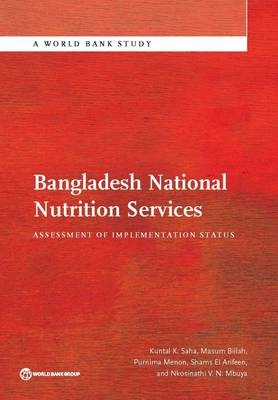
Bangladesh national nutrition services
assessment of implementation status
Seiten
2015
World Bank Publications (Verlag)
978-1-4648-0640-7 (ISBN)
World Bank Publications (Verlag)
978-1-4648-0640-7 (ISBN)
- Titel z.Zt. nicht lieferbar
- Versandkostenfrei
- Auch auf Rechnung
- Artikel merken
Presents the findings of an operations research study conducted to assess the implementation of the government of Bangladesh's National Nutrition Services Program (NNS) and to identify the achievements, determine the bottlenecks that adversely impact these achievements, and highlight potential solutions to ensure smooth delivery of the programme.
Bangladesh National Nutrition Services: Assessment of Implementation Status presents the findings of an operations research study conducted to assess the implementation of the government of Bangladesh's National Nutrition Services Program (NNS) and to identify the achievements, determine the bottlenecks that adversely impact these achievements, and highlight potential solutions to ensure smooth delivery of the program. The authors used a mixed-methods research approach to evaluate five major domains of the program: management and support services, training and capacity development, service delivery, monitoring and evaluation, and exposure to interventions. The overall NNS effort is an ambitious but valuable approach to support nutrition actions through an existing health system with diverse platforms. Although the maintenance of strong and stable leadership of NNS is an essential element to ensure integrated and well-coordinated comprehensive service delivery for the line directorate, the current arrangement is unable to ensure effective implementation and coordination of NNS. Focusing on some of the critical challenges of leadership and coordination and focusing on embedding a core set of interventions into well-matched (for scale, target populations, and potential for impact) health system delivery platforms most likely will help achieve scale and impact. Strategic investments in ensuring transparency, engaging available technical partners for monitoring and implementation support, and not avoiding other potential high-coverage outreach platforms (such as some nongovernmental organizations) could also prove fruitful. Moreover, although the government of Bangladesh and the health system in particular must lead the effort to deliver for nutrition, development partners who have expressed a commitment to nutrition must coordinate their own activities and provide the support that can deliver on nutritions potential for Bangladesh.
Bangladesh National Nutrition Services: Assessment of Implementation Status presents the findings of an operations research study conducted to assess the implementation of the government of Bangladesh's National Nutrition Services Program (NNS) and to identify the achievements, determine the bottlenecks that adversely impact these achievements, and highlight potential solutions to ensure smooth delivery of the program. The authors used a mixed-methods research approach to evaluate five major domains of the program: management and support services, training and capacity development, service delivery, monitoring and evaluation, and exposure to interventions. The overall NNS effort is an ambitious but valuable approach to support nutrition actions through an existing health system with diverse platforms. Although the maintenance of strong and stable leadership of NNS is an essential element to ensure integrated and well-coordinated comprehensive service delivery for the line directorate, the current arrangement is unable to ensure effective implementation and coordination of NNS. Focusing on some of the critical challenges of leadership and coordination and focusing on embedding a core set of interventions into well-matched (for scale, target populations, and potential for impact) health system delivery platforms most likely will help achieve scale and impact. Strategic investments in ensuring transparency, engaging available technical partners for monitoring and implementation support, and not avoiding other potential high-coverage outreach platforms (such as some nongovernmental organizations) could also prove fruitful. Moreover, although the government of Bangladesh and the health system in particular must lead the effort to deliver for nutrition, development partners who have expressed a commitment to nutrition must coordinate their own activities and provide the support that can deliver on nutritions potential for Bangladesh.
| Reihe/Serie | World Bank studies |
|---|---|
| Zusatzinfo | col. figs, tables |
| Verlagsort | Washington |
| Sprache | englisch |
| Themenwelt | Medizin / Pharmazie ► Gesundheitsfachberufe ► Diätassistenz / Ernährungsberatung |
| Technik | |
| Wirtschaft ► Betriebswirtschaft / Management | |
| Wirtschaft ► Volkswirtschaftslehre | |
| ISBN-10 | 1-4648-0640-3 / 1464806403 |
| ISBN-13 | 978-1-4648-0640-7 / 9781464806407 |
| Zustand | Neuware |
| Haben Sie eine Frage zum Produkt? |
Mehr entdecken
aus dem Bereich
aus dem Bereich
Indikation, Diagnostik, Therapie
Buch (2024)
Thieme (Verlag)
CHF 109,95
Physiologische Grundlagen, Prävention, Therapie
Buch | Hardcover (2023)
Wissenschaftliche Verlagsgesellschaft
CHF 165,20


